Starting from:
$14.95
Home
JFK Assassination
John F. Kennedy Assassination: Jim Garrison's Conspiracy Investigation Papers
John F. Kennedy Assassination: Jim Garrison's Conspiracy Investigation Papers
 John F. Kennedy Assassination: Jim Garrison's Conspiracy Investigation Papers
John F. Kennedy Assassination: Jim Garrison's Conspiracy Investigation Papers 12,668 pages of records maintained by former New Orleans District Attorney Jim Garrison, concerning his investigation of an alleged conspiracy to assassinate President Kennedy.
The family of Jim Garrison donated these papers to the National Archives’ John F. Kennedy Assassination Records Collection at the request of the Assassination Records Review Board. This collection consists of records kept at the home of Jim Garrison, District Attorney of New Orleans, pertaining to his investigation of the assassination of President John F. Kennedy. These records were created or collected by Garrison, as part of his investigation and prosecution of Clay Shaw for conspiracy to assassinate President John F. Kennedy.
Earling Carothers "Jim" Garrison was the District Attorney for the City of New Orleans, Louisiana from 1961 until 1973. He was portrayed in the Oliver Stone film "JFK" by Kevin Costner.
On March 1, 1967, District Attorney Garrison arrested prominent New Orleans businessman Clay L. Shaw (1913-1974) and charged him with conspiring to kill President John F. Kennedy. Shaw was tried in 1969. The State of Louisiana v. Clay Shaw was the only trial ever held in connection with the assassination. After a six-week trial, the jury acquitted Clay Shaw after forty five minutes of deliberation on March 1, 1969.
New Orleans District Attorney Jim Garrison has been accused of abusing his power in an attempt to prove his conspiracy theory regarding the murder of the president. Others found that Garrison’s indictment and trial of Clay Shaw provided a credible platform and new momentum for Warren Commission critics.
In its final report in 1998, the Assassination Records Review Board wrote of Garrison and his investigation, "Flamboyant and articulate, Garrison was a media sensation. Although the American public had differing opinions concerning Garrison, his investigation altered the assassination debate. The investigation popularized a radical critique of the official version of the assassination. In addition to generating assassination records, the Clay Shaw trial was also the venue for an important assassination record milestone: the first public showing of Abraham Zapruder’s film footage of the assassination."
Scope and Content
This series is arranged alphabetically by subject notation on the tabs of file folders containing documents collected or created by Garrison. The records include information pertaining to Garrison's prosecution of Clay Shaw, as well as other subjects or individuals connected to the assassination, the trial of Clay Shaw, or matters of interest to Garrison.
The material consists of correspondence, memorandums, reports, polygraph exam reports, photographs, newspaper clippings, handwritten notes, and manuscripts maintained by Jim Garrison as his personal papers pertaining to his investigation of the assassination of President John F. Kennedy. Much of the material is copies of memoranda and reports submitted to Garrison in his official capacity as New Orleans District Attorney. This collection also shows Garrison's continued interest in the assassination after his service as District Attorney, including several partial manuscripts for books about his investigation. The materials in this series relate primarily to Garrison's investigation into and prosecution of New Orleans businessman Clay Shaw in 1969 for his alleged involvement in a conspiracy to assassinate President Kennedy.
Also included are materials relating to other subjects or individuals of interest to Garrison. Among the individuals are David Ferrie; Guy Bannister; Rose Cheramie; Vernon Bundy; Perry Russo; Gordon Novel; Keith Thornley; Layton Martens; Richard Nagell; Dean Andrews; and Sergio Archacha Smith. Among the subjects covered by this series are the possible involvement of the Central Intelligence Agency in the assassination; religious sects; the possible involvement of anti-Castro Cubans; and the Warren Commission's investigation of the assassination. Also included in this series are materials documenting the relationship between Garrison and other critics of the Warren Commission such as Mark Lane and William Turner (editor of "Ramparts" magazine) as well as his reaction to critics of his own investigation.
Some document folders of note carry the subject titles:
Central Intelligence Agency
Conspiracy to Kill JFK-- Its Meaning
Ferrie, David
Early script for movie "JFK"
Materials pertaining to the prosecution of Garrison in 1971
Robert Kennedy-Grand Jury Transcript, Medicolegal Investigation (Coroner) & FBI Reports
Lead Files
Oswald's Notebook
Secret Service - New Orleans Investigations
Time, Place and Number Correlations (Ruby, Ferrie, Oswald and Shaw)
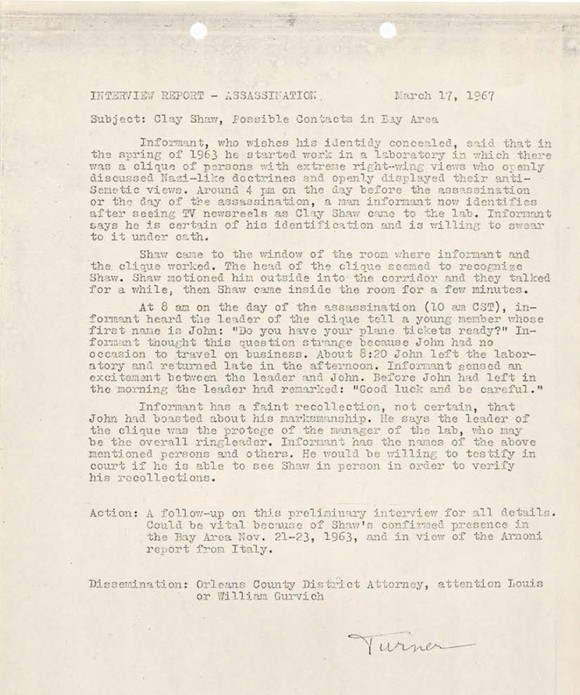
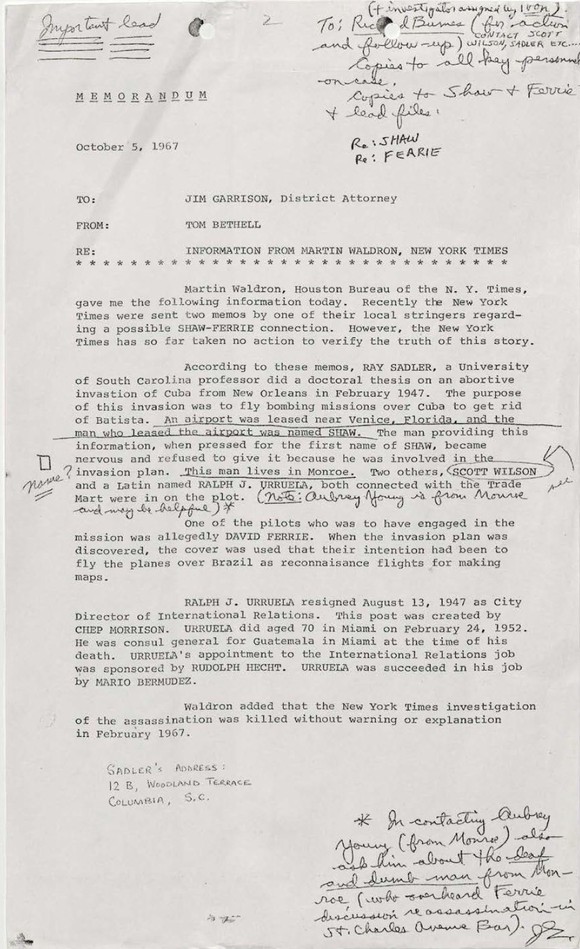
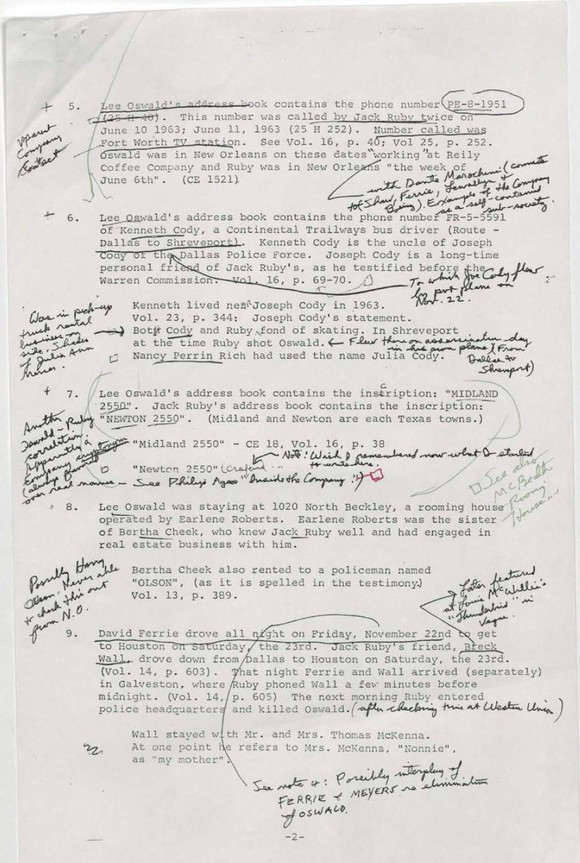
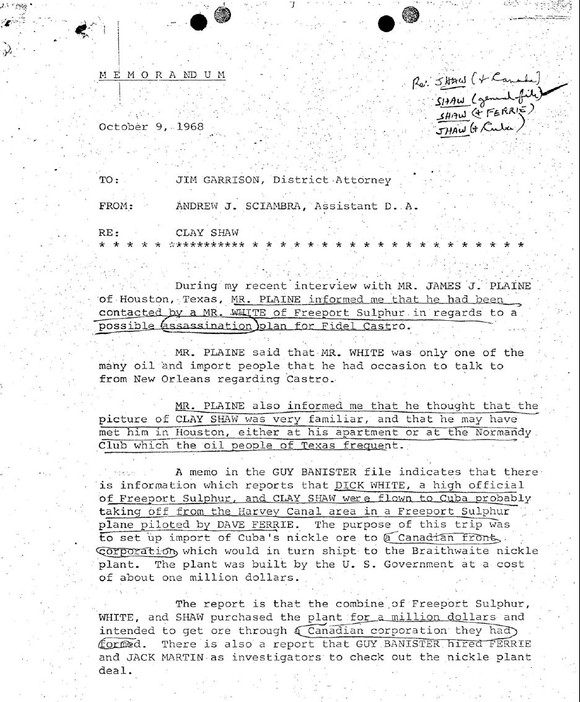
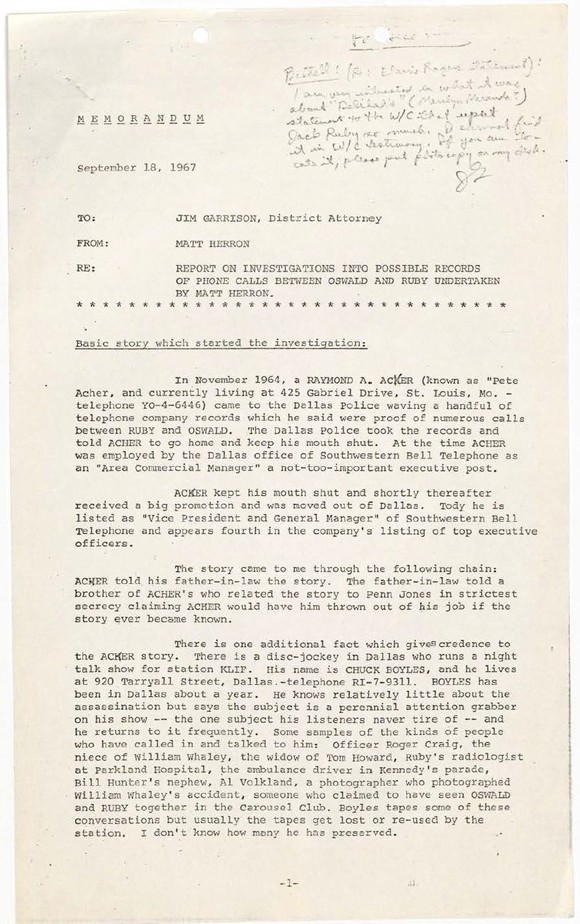

19 files (1.8GB)



